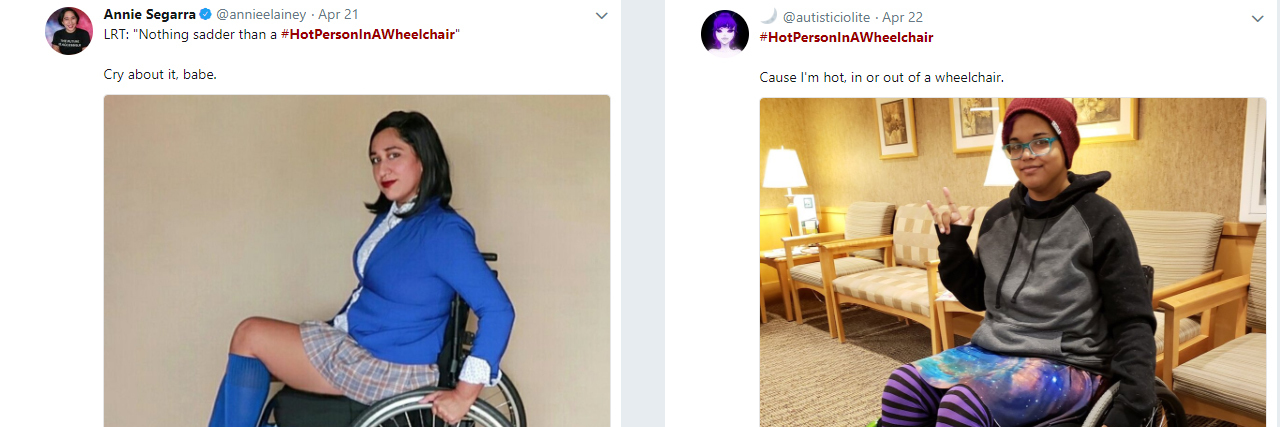There is a major lack of diverse and positive representation of disability in the media and popular culture. As someone who is fairly new to this, it has very real and powerful consequences for me. Luckily the internet and social media offers a space for communities to be formed and diverse voices to break through the ableist narratives that monopolize the already scant representation of people with disabilities. And for that I want to thank the disabled communities of Twitter for pushing to change the narrative. You have unknowingly pulled a stranger back from the edge; who knew a hashtag could be so powerful?
• What is Ehlers-Danlos Syndrome?
• What Are Common Ehlers-Danlos Syndrome Symptoms?
I am fairly new to mobility aids, recently getting a cane and a walker. As it turns out though, I am not that new to disability. After three years of debilitating illness, it took a long-awaited and hard-fought-for diagnosis to realize how empowering mobility aids could be in my situation. And even then it was not a healthcare professional who helped me get to that realization, but online chronic illness and disability communities.
After being diagnosed with hypermobile Ehlers-Danlos syndrome (HEDS), a multisystemic, degenerative connective tissue disorder, I felt my use of mobility aids was validated. But I still carried a lot of doubt, fear and I’m ashamed to admit it, embarrassment about the idea of using mobility aids. Of course there is nothing wrong with not wanting to be ill, but my initial feelings about mobility aids were polluted by ableist stereotypes and misconceptions about disability.
I should not have waited to be medically validated to consider using mobility aids, and I certainly should not feel embarrassed or have to fear using them. Unfortunately there is a serious lack of informative, diverse and positive representation of disability in the media and popular culture. The ableist stereotypes perpetuated by films like “Me Before You,” in which living boldly is only possible for able bodies, have a very real impact. Popular culture is both informed by and informs society. So when I began discussing mobility aids, I was met by some with horror and a feeling that I was “giving up on life” rather than empowering myself.
In the past couple of weeks an incredible hashtag has been making waves across disabled communities on Twitter — #HotPersonInAWheelchair. The hashtag is a response to a tweet from 2014, in which Ken Jennings wrote “Nothing sadder than a hot person in a wheelchair.” The hashtag was initiated by Annie Elainey, an intersectional activist, and the posts are full of joy and beautifully directed rage. People with disabilities from all corners of Twitter are reacting to Jennings’ ableist tweet with acts of celebration and protest. Members are proudly presenting their sex appeal, their individuality and their resilience.
Oh we’re doing this? Okay! #HotPersonInAWheelchair pic.twitter.com/YZGVgpAOrm
— Bella (@BELLAsayswhat_) April 23, 2018
I don’t know why this tweet has resurfaced now, but I am all for the response. I am from the U.K. and have never heard of this Ken Jennings person and don’t wish to learn anything further about him now. In the U.K. we also have a serious problem with ableism being spouted under the guise of comedy. Ricky Gervais is a prime culprit, and these narratives are going unchallenged and unnoticed in the mainstream, allowing the culture of ableism to thrive to devastating effects.
There is a polarized idea of disability represented in popular culture. There are the superhuman disabled people winning Olympic medals, all power to them. Or there are the narratives like “Me Before You” in which disability is objectified through an ableist lens of hopelessness, tragedy and a life not worth living. There is very little in between, and these two polarized stories have one thing in common. All responsibility for disability is given to the disabled person. They are either revered for overcoming their impairment or pitied as their impairment is seen as too severe to bear. The responsibility is very rarely laid at society’s door.
[Image: light-skinned buzzed-head person in wheelchair on sunny day. A rainbow flag flies from the back of the chair] pic.twitter.com/VosSi5SnNq
— BeingCharis (@BeingCharisBlog) April 22, 2018
Disability is often viewed through two models, the medical model and the social model. The dominant narrative views disability through the medical model. The medical model of disability as outlined by the charity Scope states, “people are disabled by their impairments or differences.” The social model of disability was developed by disabled people and is the view that activists and advocacy groups are fighting for. It states that “disability is caused by the way society is organized, rather than by a person’s impairment or difference. It looks at ways of removing barriers that restrict life choices for disabled people. When barriers are removed, disabled people can be independent and equal in society, with choice and control over their own lives.”
The ableist, cheap comedy of the likes of Ricky Gervais relies on and upholds the medical model, letting society off the hook for its failures. With the medical model being upheld, all the responsibility is left on the disabled person. In the current right wing political climate in the U.S. and U.K. with Trump and May at the helm, the rights and lives of disabled people are at risk. People are dying, which is no joke.
The disabled community of Twitter, along with intersectional disability activists are challenging this dominant ableist narrative. The #MeToo movement has demonstrated the power of social media and the hashtag by breaking into mainstream popular culture. Only time will tell if this movement leads to long term, real change. Regardless, the collaborative news feed now being spontaneously curated under the hashtag #HotPersonInAWheelchair has given this disabled person #DisabledJoy, so whether you’re disabled, abled-bodied or not really sure, I hope you’ll get behind it.
#DisabledJoy #DisabledAndCute #HotPersonInAWheelchair #BabeWithACane #DisabledResist #TheFutureIsAccessible

